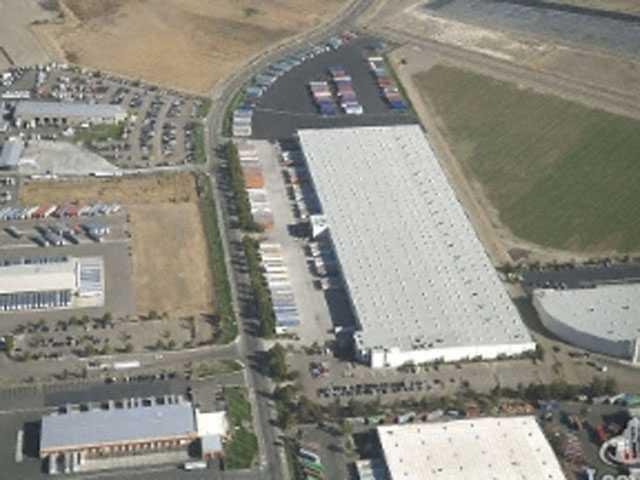Mountain Valley has Google.
Lodi has its own retail electrical service.
Lathrop has Simplot and a repertoire of major distribution centers ranging from Home Depot and In-and-Out to JC Penney.
Anaheim has Disneyland and dozens of hotels.
And, if negotiations are successful, Manteca will have Great Wolf.
What those things all have in common is the ability to bolster municipal general funds weakened by residential property taxes and sluggish per capita sales tax expenditures.
“The San Joaquin Valley was the hardest hit area with foreclosures after Detroit and that has hit the two biggest sources of general revenue for cities the hardest - property and sales tax,” noted Manteca City Manager Steve Pinkerton.
The ripple effect of the foreclosure crisis through the economy has seen Manteca’s general fund go from $36.5 million in the 2007-08 fiscal year down to $26.3 million this fiscal year.
Manteca for years had been an almost exclusive bedroom community to the Bay Area with a small smattering of industry such as the now shuttered Indy Electronics and defunct Spreckels Sugar. It’s retail base up until the opening of Spreckels Park 10 years ago failed to capture more than 70 percent of Manteca residents’ retail dollars and even farmland - which surrounds Manteca - had a minimal impact with only one major agricultural employer in town in the form of Eckert’s Cold Storage.
Manteca has worked to improve its retail sales retention in recent years with the most notable examples being Bass Pro Shops that pulls well over 95 percent of its business from outside the city to Costco that brought Manteca consumer dollars back to town from Modesto and Tracy.
And while projections are that after $4.2 million cuts are made in the general fund spending for the fiscal year starting July 1 that revenue for Manteca’s day-to-day municipal operations should stop falling for at least the next four years, Pinkerton said it is imperative to secure other sources of income to provide city services.
Manteca’s strategy to diversify its tax base borrows pages from success stories in Mountain View, Lathrop, and Anaheim.
Manteca can’t do what Lodi has done which is take about $7 million a year in “profit” from the city owned electrical service to pump up that city’s general fund. Lodi has about 6,000 residents less than Manteca but its general fund is $11.3 million stronger.
While Pinkerton cautions against comparing apples and oranges, the somewhat stronger financial position of some cities underscores the need to rely less on residential property tax and traditional sales tax and more on other forms of property tax and niche spending.
Google is pumping up Mountain View’s general fund with thousands upon thousands of daytime consumers in the employ of Google with plenty of discretionary income they spend money during the work day at restaurants and retailers as well as services in that city. The result is Mountain View captures a significant amount of sales tax beyond what it can from just its own residents.
Lathrop has 74.8 million square feet of industrial buildings as opposed to Lodi’s 37 million square feet and Manteca’s 25.3 million square feet. The importance of industrial buildings on a tax base is significant. Such uses typically generate significantly more in taxes than they use in services as opposed to housing which is the exact opposite.
Manteca has one major business park - CenterPoint - that is moving forward in tandem with the quadrupling of the Union Pacific intermodal station. CenterPoint will add 4 million in major distribution space.
Austin Road Business Park has the potential of adding significantly more industrial park space.
But perhaps the biggest benefit - should it happen - is Great Wolf Resort.
“Hotels generate a unique revenue stream (through room taxes) to a city without creating a major impact on services,” Pinkerton noted.
McWhinney Development and their operating partner Great Wolf Resorts are negotiating with city staff to locate a 400 to 600 room hotel, indoor water park, and convention center immediately west of Costco along the 120 Bypass.
Manteca - with the Great Wolf Resort deal alone - is in the hunt for between $5 million and $7 million annually in additional general fund money plus 500 permanent private sector jobs.
The general fund revenue would be generated by a special entertainment zone hotel room tax. The estimated annual city tax receipt is based on the revenue at other Great Wolf Resorts.
Pinkerton said the city’s economic development staff has been instructed to go after agricultural processing jobs when the opportunity arises. It is something that Manteca in the past has ignored because they weren’t considered necessarily the highest paying jobs.
“In Stockton, a lot of families that were able to pick up a second job at a food processor were able to earn enough money in the household to buy homes,” Pinkerton said.
City needs diversified tax base
It is why Manteca is in hunt to snare Great Wolf



